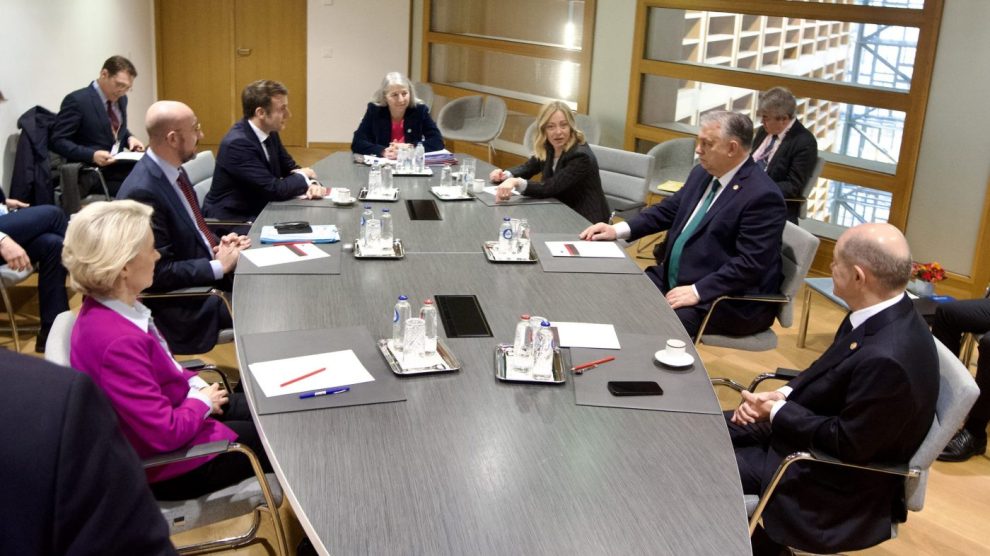EU (finally) greenlights funds for Ukraine. On Thursday, the European Union agreed on a €50 billion aid package for Ukraine after Hungarian Prime Minister Viktor Orbán yielded to their demands to lift his veto. The deal was secured after EU leaders agreed to an optional review in two years “if needed,” a compromise with PM Orbán, as he had demanded yearly reviews.
- The package will allow Ukraine to remain solvent over the next four years, with the first tranche expected in March. Ukrainian President Volodymyr Zelensky welcomed the funding, saying it would help to keep the economy running in 2024 and sustain essential services.
- The breakthrough is all the more important, considering that the United States’s own aid package for Ukraine is being held up by Congress.
How we got here. Since the beginning of Russia’s full-scale invasion of Ukraine, Mr Orbán has stood out as the main impediment in the bloc’s support to Kyiv. The Hungarian PM has repeatedly demonstrated his closeness with Russian President Vladimir Putin and continued to bolster the economic ties with him, despite the EU’s efforts to distance itself from Moscow.
Enter Meloni. According to Italian government sources, Italian Prime Minister Giorgia Meloni played a key role in brokering the agreement. She reportedly acted as an intermediary for the past few months, and has ramped up her efforts in the past week, to the point where she met him for last-minute talks in Brussels on Wednesday night.
- She was also one of the few leaders in the closed-door meeting with PM Orbán, along with the likes of France’s Emmanuel Macron and Germany’s Olaf Scholz.
Political machinations. The Italian PM also used her talks with PM Orbán to bring up a national matter – that of the fair treatment of Ilaria Salis. The Italian anti-fascist activist faces up to 11 years in jail in Hungary for allegedly attacking two neo-Nazis, and her trial pictures have become politically relevant in the Italian discourse. The Hungarian leader assured his Italian counterpart that she would be treated fairly – highlighting the political entente between the two, which might develop into closer cooperation with June’s EU elections on the horizon.
Think European Parliament. Their ties might pave the way for a possible rapprochement between PM Orbán’s Fidesz and the European Conservatives and Reformists (ECR), which PM Meloni leads. However, this might only happen after the EU elections, as the Hungarian PM has clearly stated he will not join any group before the key date in June.
Upcoming field choice? With the elections rapidly approaching, the far-right Identity and Democracy (ID) is also calling on the Hungarian leader to join it. It’s headed by the League, which in turn is led by PM Meloni’s governing ally and political rival, Matteo Salvini. The latter has time and again called to form a centre-right coalition at the European Parliament, but that prospect does not seem feasible according to recent polling.
- With the ECR looking for increased political relevance and ID possibly electing to remain at the margins, PM Orbán might have to choose between joining a less influential group – thus diminishing his influence within Brussels – or softening his stance, particularly on Kyiv, and joining the more mainstream ECR…
- …which could also potentially lead to a reprisal of his experience with the European People’s Party.




